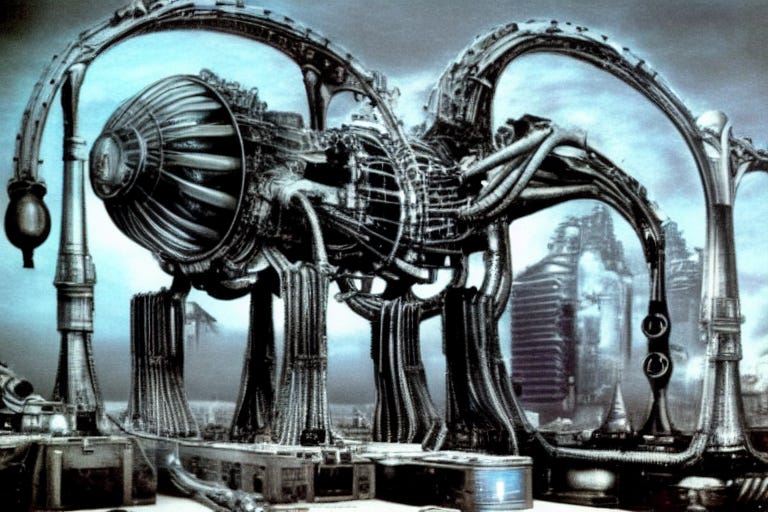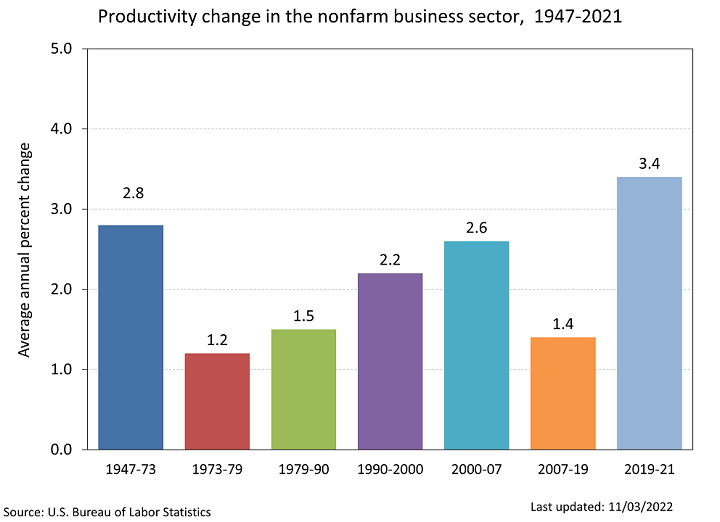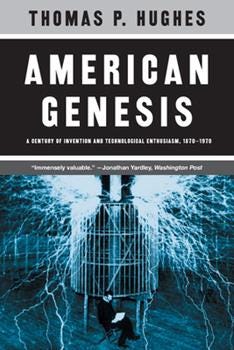
We’re nearing a terrible anniversary. 1973 was a pivotal year for America — and also for the world given America’s critical role in pushing forward the frontier of human economic and technological progress. One could plausibly date the statistical start of America’s Long Stagnation (the long-term downshift in economic and productivity growth) to that year. More precisely, one could date the start of the deceleration to the third quarter of 1973 when productivity growth plunged 3.7 percent on an annualized basis. It was the first of five consecutive quarters of negative productivity. That decline came with a nasty recession, so it’s tempting to write off the productivity slowdown as a natural consequence of that economic downturn.

But the end of the recession didn’t mark the return to the postwar GDP boom, just as the 1980s decline in oil prices didn’t lead to a rebound in productivity growth. Popular macro-explanations for the Long Stagnation include a) the full exploitation of the “great inventions” of the Second Industrial Revolution and b) much of the important low-hanging fruit of discovery and innovation having been picked. That, as evidenced by research efforts rising substantially and research productivity declining sharply.
But our own actions have a role to play. Have we done enough to fund science and technology research? Have we done enough to remove barriers to the entrepreneurial processing of ideas into inventions and commercial innovations that end up as new goods and services? Economist Martin Weitzman explained in 1998 that “the ultimate limits to growth lie not so much in our ability to generate new ideas as in our ability to process an abundance of potentially new ideas into usable form.”
I’ve repeatedly written about the impact of the emerging environmental movement in the postwar years. Cleaner air and water? Yes. But also a flurry of anti-growth environmental regulations and a more pessimistic and constrained view of what the future could be. And both those impacts continue to weigh on America today. Those rules still make it hard to build, while that attitude undermines efforts to change the rules and embrace the notion that our future can be one of mass abundance beyond anything we’re imagining right now. (Certainly more than what Hollywood typically imagines.)
That an environmental movement emerged is hardly a shock. America would’ve had one even without Rachel Carson’s Silent Spring. When countries get richer, their citizens start valuing more about the natural world around them and become more willing to accept trade-offs such as costlier energy or pricier consumer products.
But was it inevitable that America’s environmental movement would become one that a) focused on scarcity rather than abundance, b) saw people as global liabilities rather than civilizational assets, and c) viewed mass consumption as a symptom of rot rather than of progress? To this day, many environmentalists nod approvingly at economically and philosophically puerile degrowth statements such as climate activist and anti-capitalist Greta Thunberg’s famous, “You have stolen my dreams and my childhood with your empty words… People are suffering. People are dying. Entire ecosystems are collapsing. We are in the beginning of a mass extinction, and all you can talk about is money and fairy tales of eternal economic growth. How dare you!”
Imagine something more akin to today’s “eco-modernism” which argues that “humans use their growing social, economic, and technological powers to make life better for people, stabilize the climate, and protect the natural world.” This views humanity as both the cause of and solution to our environmental problems. Eco-modernists see climate change as fundamentally a clean energy problem, not a problem of obscenely rampant consumerism that must be dramatically reduced.

Instead, we got an environmental movement that identified human activity as the problem. It manifested a philosophy of Less, not More — other than more regulations. How did this happen? I think some important thinking about this question can be found in American Genesis: A Century of Invention and Technological Enthusiasm, 1870-1970 by Thomas P. Hughes, the University of Pennsylvania historian of technology and its impact on American society. In a 2014 New Atlantis essay on Hughes, who died earlier in February of that year, G. Pascal Zachary wrote that “Hughes sympathetically captured the American zeal for innovation, he also sought to give full credence to informed critics of technology. According to Hughes, these twin poles — embrace of the new and wariness of where the new would take us — provided the foundation for what made, and makes, America exceptional in global terms.”
In American Genesis, Hughes argues, essentially, that the Atomic Age and Vietnam War combined to fashion the environmental movement into one cynical about economic growth and tech progress. The former, with its “systematic linking of military funding, management, and contract letting, industrial, university, and government research laboratories, and numerous manufacturers” became the worrisome model of massive technological systems that President Eisenhower described as the “military-industrial” (and university) complex. It’s as if America was turning into one giant Manhattan Project. Then came Vietnam:
The use by the U.S. military, as John McDermott put it, of capital- and managerial-intensive technological systems to lay waste Vietnam only heightened the public’s anger toward, and anxieties about, technology. … Thoughtful Americans could no longer glibly associate technology with incandescent lamps, Model T’s, and '“better things for better living.” … [Activists and intellectuals] began to see modern technology, especially large technological systems, as the common cause of the cultural and social maladies about which they were protesting. Chemical corporations producing the napalm and destructive herbicides used in Vietnam also made, for example, the pesticides, herbicides, and pollutants fouling the environment at home. Corporation heads presiding over large systems of production shuttled back and forth to the Department of Defense, where they managed systems of destruction. Talk of efficiency, order, centralization, and systematization was common to the military and to industry.
The sociologist and philosopher of technology Lewis Mumford called this large, hierarchical, technocratic and technological system supposedly devouring America the Mega-Machine, one in which humans were mere components much like the thousands of pyramid builders in that earliest of Mega-Machines, ancient Egypt. As Mumford said in a 1966 speech at Harvard University, according to the Harvard Crimson:
"Madness and non-intelligence is not a sufficient answer to the excess intelligence of today's "Mega-Machine," philosopher Lewis Mumford warned last night.
"I can understand the chaotic form that the youthful rebellion has taken, and in a sense it is justified," he told a densely-packed audience in the Leverett House Old Library. "But chaos is not a response to regimentation, it is its opposite face" he added.
The 71-year-old author reflected that "for the past 30 years, I have been engaged in a fruitless effort to save Rome." Like Rome, Mumford maintained modern society "is drifting from bad to worse," refusing to learn the lessons of the past, forcing "life from its side."
According to Mumford, the spread of science and technology is creating a "universal, but inadequate society," what he terms the "Mega-Machine." Unlike previous systems of oppression, the Mega-Machine is not based upon a principle of punishment, but on the contrary idea of reward. "The Mega-Machine," Mumford explained in his deep, articulate rumble, "offers endless material abundance for all abundance beyond even the dreams of the Ford Foundation.
This "varsity rich," but "totalitarian system," will free men from the compulsion to work, — automation and cybernetics will take care of production — only to replace it with the compulsion to consume."
While it’s hard to imagine a scenario where an industrial society doesn’t have an Atomic Age given the natural directional momentum of science, the Vietnam War and paranoia it caused among environmentalists about Mumford’s Mega-Machine (a theory that history has not treated well: the Atomic Age soon ended, and Corporate America was disrupted by Silicon Valley startups) wasn’t inevitable. There are plenty of alt-history scenarios that suggest how the conflict could have been avoided. And if it had, perhaps a very different kind of climate movement would have emerged. Perhaps, 1973 would have been a mere hiccup in the postwar Golden Age as society would have responded to the start of the Great Stagnation by redoubling its efforts to accelerate growth and progress. More R&D, no NEPA. And maybe a Long Acceleration.

This is a really good point re: the historical contingency of the environmental movement. It could have gone differently.
Jim, thanks for tuning me on to this book, American Genesis—I read it and found it fascinating. I wrote up some notes and excerpts from it on technocracy and the counterculture here: https://rootsofprogress.org/american-genesis-part-2-technocracy-to-counterculture